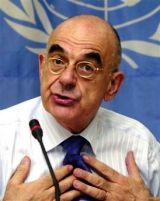UN envoy calls for US$1 billion to promote peace in Sudan
By EDITH M. LEDERER
UNITED NATIONS, July 23, 2005 (AP) — The U.N. envoy for Sudan has called for more than US$1 billion (A?820 million) in additional money this year to promote peace throughout the country after decades of war and to launch a new battle against poverty.
 Jan Pronk told the U.N. Security Council on Friday that the peace agreement signed in January by the government and southern rebels is having “a snowball effect” and agreements to end the two remaining conflicts in western Darfur and the east are possible before the end of the year.
Jan Pronk told the U.N. Security Council on Friday that the peace agreement signed in January by the government and southern rebels is having “a snowball effect” and agreements to end the two remaining conflicts in western Darfur and the east are possible before the end of the year.
“All in all, there is room for optimism, but we must be realistic,” he said. “The situation is fragile, utterly fragile.”
Pronk told a news conference afterward that his cautious optimism was shared by council members during closed-door discussions following his briefing.
He warned that the neglect, exclusion, injustice and bad governance suffered by millions of Sudanese cannot be healed overnight, and he cautioned that it takes more than agreements to achieve democratic reforms and guarantee human rights.
“Poverty is deep, very deep, more than in nearly all other countries of Africa,” he told the council. “The battle against poverty, following the fight for peace, will require decades of sustained efforts by the Sudanese and by the international community.”
“Ongoing reconciliation, as well as management of conflicts between nomads and farmers, will require much political attention and resources for compensation and development,” Pronk added.
The revised U.N. plan for Sudan for 2005 calls for nearly US$2 billion (A?1.64 billion) for humanitarian assistance and recovery efforts, but so far only 40 percent _ about US$800 million (A?656 million) _ has been committed, he said.
“I call on all donors to adhere to their pledges, and to increase them,” Pronk said.
He told reporters that nearly US$2 billion (A?1.65 billion) will likely be needed next year as well, but if there is peace in Darfur the amount will drop in 2007.
Sudan will also need development assistance because the US$4.5 billion (A?3.71 billion) pledged at a conference in Oslo, Norway, is less than requested, he said.
Pronk recommended that the World Bank and International Monetary Fund establish a consortium to channel money into development projects.
“The humanitarian situation in south Sudan is very fragile,” he warned. “Not addressing this wholeheartedly would betray the expectations of millions and would jeopardize the chance to make peace sustainable, until at least six years from now, when people have to choose, by referendum, either for unity or separation.”
Pronk said the total lack of infrastructure in southern Sudan, coupled with heavy rains, has created difficult problems, including delaying the deployment of some military troops to monitor the north-south peace agreement. The United Nations now expects full deployment by the end of October, he said.
The U.N. mission in Sudan has also decided to give the highest priority to facilitating the voluntary return of internally displaced people and refugees from the south during the upcoming dry season, he said.
Pronk urged the parties and the international community not to allow “powers in the dark or grumbling spoilers to harm the letter and the spirit” of the north-south peace agreement.
In a report to the council Thursday, Secretary-General Kofi Annan said Darfur is a less active war zone than it was a year ago, but rebels and government-backed militias are still carrying out attacks, raping women and creating a climate of fear and intimidation.
Pronk cautioned that “banditry has increased and has become ferocious. Attacks can flare up, Militia have not been disarmed. Arbitrary arrests and inhuman treatment of prisoners still take place.”
Nonetheless, both Annan and Pronk expressed optimism that a declaration in principle signed by the government and Darfur rebels in the Nigerian capital, Abuja, on July 5 could lead to a peace accord by the end of the year.
“Further confidence-building is necessary, but there is a light at the end of the tunnel,” Pronk said.
Once a Darfur peace agreement is signed, more than 2 million people who fled their homes will have to return, but he stressed that they will only do so when they feel secure.
That will require a further expansion of the African Union force and planning needs to start soon, Pronk said. The force is currently being built up to 7,500 troops.
